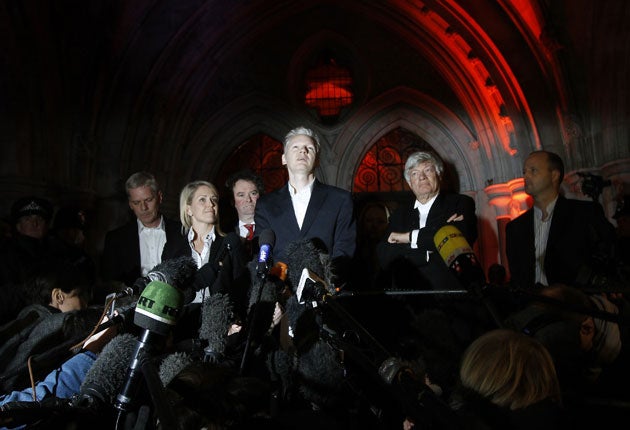Who's afraid of the interweb? Judges to rule on Twitter in court
New media threatens a revolution in judicial reporting. Siobhain Butterworth reports

Should journalists be allowed to tweet from court?
It's become a question of some urgency since Tuesday, when district judge Howard Riddle gave the nod for reporters to tweet proceedings from inside Westminster Magistrates' Court during Julian Assange's bail hearing. It is a matter of such importance that the Lord Chief Justice has already announced there is to be a consultation on live reporting.
Tuesday's ruling prompted some commentators to hail the dawn of a new era. By Thursday, however, journalists, bloggers and others interested in reporting how justice was being done in Assange's case were back to good old-fashioned pen and paper after Mr Justice Ouseley ruled against posting to Twitter from court. Too distracting, he said.
Too distracting? In my experience, courtrooms can be uniquely distracting places. Silence in court, while an irreproachable instruction, is hellishly difficult to achieve. Courts have to contend with a cacophony of sneezing, coughing, whispering, endless standing up and sitting down, heavy things being dropped, paper shuffled, possessions ordered and reordered, quietly dramatic entrances and exits, muttered remonstrations, water being poured, gulped and spilt, prodding, tapping, snorting and grunting, and that's just the lawyers.
Any "disturbance" caused by people tweeting is arguably minor by contrast. After all, electronic devices can be switched to silent.
Contrary to popular belief, there is no statutory ban on tweeting in court. While the pre-digital age Contempt of Court Act 1981 does not allow sound recordings to be made without the court's permission, and prevents photographs being taken or sketches made in court, it doesn't prohibit creating text using electronic devices. Judges do, however, have the power to set the rules for behaviour in the courtroom and that is why Mr Justice Ouseley was able to rule against tweeting in the High Court last week.
The Judicial Communications Office said that the judge recognised there was a debate about tweeting and he didn't want to pre-empt a considered policy decision.
The debate about reporting live from the courtroom includes concerns about accuracy, fairness and the effect on jurors who may come across false information, but these concerns exist regardless of whether reporters use pen and ink or keyboards in court. "We have to stop treating courts like a church and the judge like some deity," says Louis Charalambous of the London law firm Simons Muirhead & Burton. "It is time we had a sensible debate that allows for modern electronic communications that do not interfere with the smooth running of a case. Courts and court users should enter the electronic age sooner rather than later."
In November the Lord Chief Justice, Lord Judge, expressed some anxiety about the impact of technology on juries. He pointed out that although trial judges direct juries to try cases solely on the evidence they hear in court and tell jurors not to consult the internet, in several cases jurors have ignored the judge's instructions to the detriment of defendants, witnesses and victims of crime. "To allow court-based tweeting is likely to increase the potential for prejudicial material regarding the defendant or a witness to become available on the internet," said Lord Judge. "The next problem is that even if a tweet originating in a courtroom itself may be a fair and accurate observation or report, responses of other Twitter users may not be."
As Lord Judge recognised, there is little difference between reporters leaving the courtroom at intervals to file copy by phone, as they have for several decades, and allowing live reporting from inside the court. In fact, some lawyers argue this may be altogether less disruptive: "Tweeting is relatively unobtrusive compared with scribbling away and tipping up seats and going in and out of the courtroom, which is what happens anyway,"says Rosalind McInnes, the author of Scots Law for Journalists. "As long as it's not disruptive of the court process I don't see anything wrong with it."
Twitter can never replace the detailed accounts of court cases traditionally provided by media organisations, nevertheless it has the potential to bring some elements of court reporting into the 21st century. Until now, the judiciary has tended to see the internet as a problem rather than an opportunity to bring the processes of justice further into the open, but things may be about to change.
Join our commenting forum
Join thought-provoking conversations, follow other Independent readers and see their replies
Comments